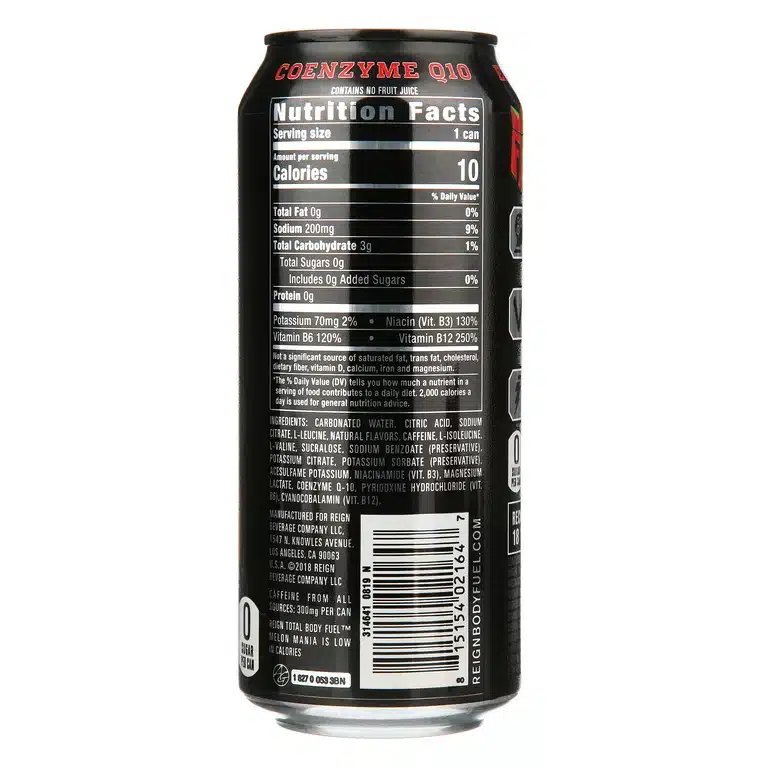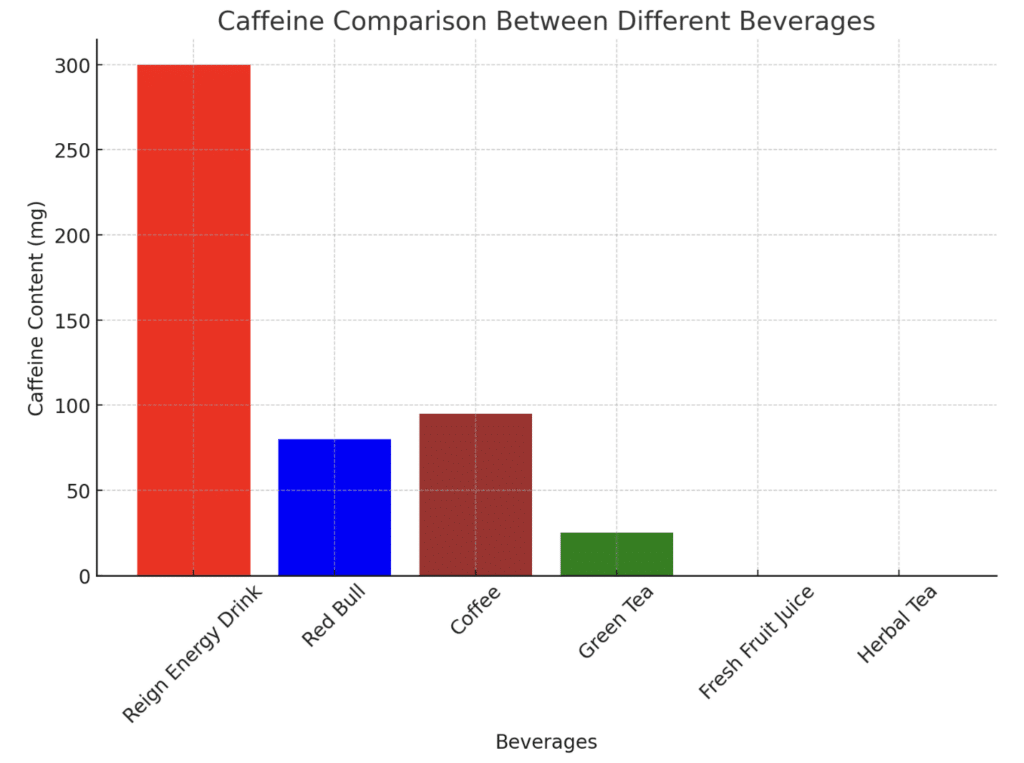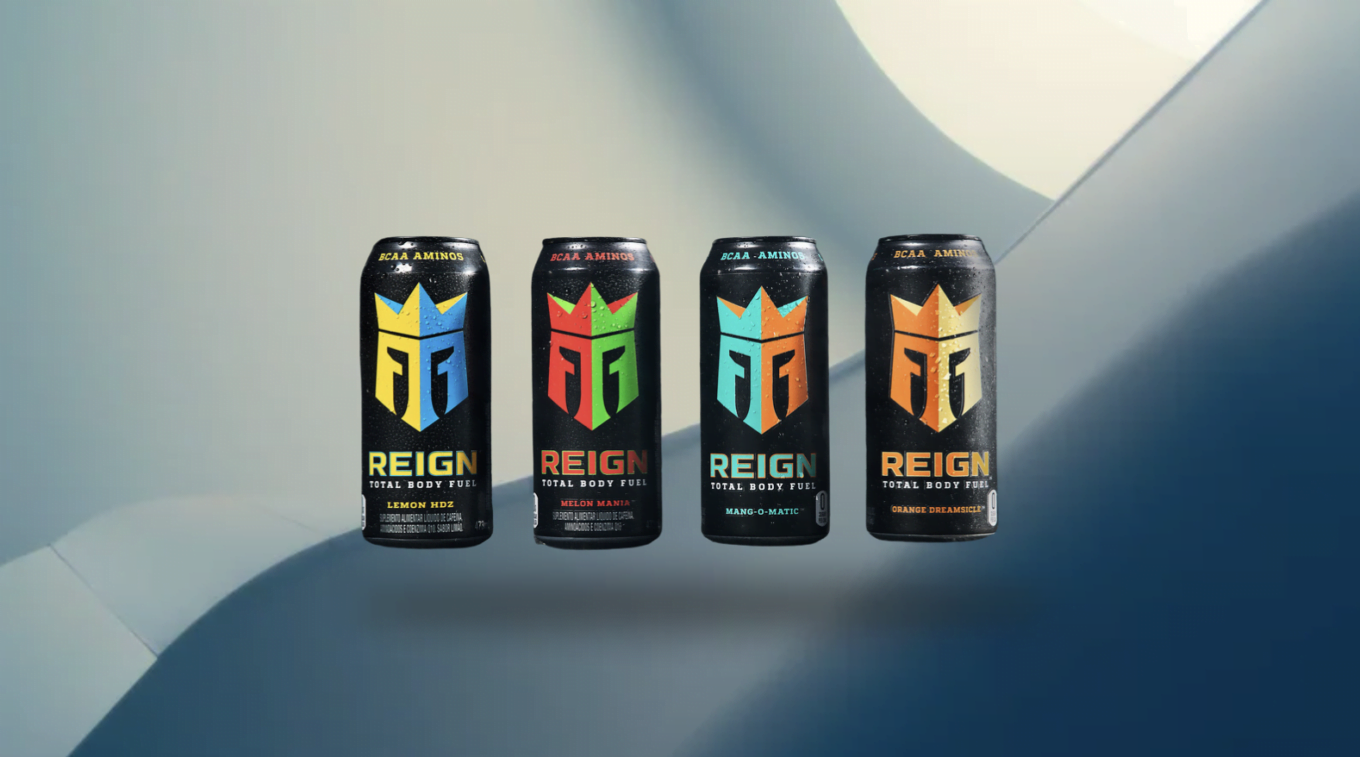Are you relying on Reign Energy Drink for a quick energy fix?
While the promise of a powerful caffeine boost may seem appealing, the potential health risks could make you uneasy.
Reign packs 300 mg of caffeine per can, more than triple the amount in a regular cup of coffee. Consuming such high levels of caffeine can lead to jitters, anxiety, and even heart palpitations.
But don’t worry—we’ve got you covered. This eye-opening article explores the science behind Reign’s caffeine content and its effects on your body and mind.
Get ready to uncover the truth about this popular energy drink and learn how to make more informed choices for your well-being.
What is Caffeine?

Caffeine, a natural stimulant, is commonly found in coffee, tea, and cacao plants.
This widely consumed substance stimulates the central nervous system, increasing alertness and reducing fatigue.
When consumed, caffeine quickly absorbs into the bloodstream and travels to the brain, blocking the action of adenosine, a neurotransmitter that promotes relaxation and sleepiness.
Caffeine keeps the brain alert and attentive by inhibiting adenosine. Additionally, caffeine triggers the release of other neurotransmitters like dopamine and norepinephrine, which can improve mood, concentration, and overall cognitive function.
The effects of caffeine can typically be felt within 15 to 45 minutes of consumption and may last for several hours, depending on factors such as individual metabolism, tolerance, and dosage.
Caffeine’s Role in Beverages

Caffeine’s stimulating properties have made it a popular ingredient in various beverages worldwide.
Caffeine is widely used in traditional drinks like coffee and tea and in modern beverages such as soft drinks and energy drinks to boost energy and mental focus.
- Caffeine in natural sources like coffee beans and tea leaves acts as a plant defense mechanism, deterring insects and other animals from consuming them. When these plants are harvested and processed, the caffeine content is extracted and becomes part of the resulting beverage.
- On the other hand, many soft and energy drinks contain synthetically produced caffeine added during manufacturing. While caffeine is chemically identical to that found in natural sources, its concentration and combination with other ingredients like sugar, artificial sweeteners, and vitamins can create a more potent and potentially harmful beverage.
It’s important to note that the caffeine content can vary significantly between different types of beverages.
For example, an 8-ounce cup of coffee typically contains around 95 mg of caffeine, while a similar serving of tea may have 14-60 mg, depending on the variety and brewing method.
Soft drinks usually range from 20-40 mg per 12-ounce serving, whereas energy drinks like Reign can contain up to 300 mg per 16-ounce can, far exceeding the caffeine content of most other beverages.
Introduction to Caffeine Content in Reign
| Reign Flavor | Caffeine Content (per can) | Comparison with Coffee (95mg per 8 oz) | Comparison with Soft Drinks (approx. 20-50mg per 12 oz) |
|---|---|---|---|
| Reign Total Body Fuel | 300 mg | Approx. 3x more than one coffee | 6-15x more than a soft drink |
| Reignbow Sherbet | 300 mg | Approx. 3x more than one coffee | 6-15x more than a soft drink |
| Orange Dreamsicle | 300 mg | Approx. 3x more than one coffee | 6-15x more than a soft drink |
| Melon Mania | 300 mg | Approx. 3x more than one coffee | 6-15x more than a soft drink |
| White Gummy Bear | 300 mg | Approx. 3x more than one coffee | 6-15x more than a soft drink |
| Razzle Berry | 300 mg | Approx. 3x more than one coffee | 6-15x more than a soft drink |
Reign Energy Drinks have gained popularity among consumers seeking a powerful energy boost, largely due to their high caffeine content.
With 300 mg of caffeine per 16-ounce can, Reign contains significantly more caffeine than most other energy drinks and coffee beverages.
While this level of caffeine can provide the desired stimulating effects, it also raises concerns about potential health risks.
Immediate Effects of High Caffeine Intake

1. Heightened Alertness and Wakefulness
As a central nervous system stimulant, caffeine can effectively increase alertness and reduce feelings of fatigue.
When consumed in high doses, such as those found in Reign Energy Drinks, these effects are amplified, leading to a more pronounced boost in mental focus and wakefulness.
2. Disrupted Sleep Patterns
However, the high caffeine content in Reign can also interfere with normal sleep patterns, especially when consumed later in the day.
Caffeine’s stimulating effects can make falling or staying asleep difficult, reducing sleep quality and duration. This disruption can result in daytime drowsiness, impaired cognitive function, and feeling unrefreshed upon waking.
3. Increased Anxiety and Nervousness
For some individuals, particularly those sensitive to caffeine, consuming high amounts can trigger feelings of anxiety, jitteriness, and nervousness.
The stimulating effects of caffeine can cause an increase in heart rate and blood pressure, leading to a sense of unease or even panic.
These effects may be more pronounced in those with pre-existing anxiety disorders or low caffeine tolerance.
Long-Term Health Risks Associated With High Caffeine Intake
1. Cardiovascular Health Concerns
Regular consumption of high levels of caffeine, such as those found in Reign Energy Drinks, may have detrimental effects on cardiovascular health over time.
Caffeine can cause a temporary increase in heart rate and blood pressure, which, when experienced frequently, can put additional strain on the cardiovascular system.
This increased strain may contribute to the development of heart disease, hypertension, and other cardiovascular problems.
2. Caffeine Dependence and Withdrawal
Consuming high amounts of caffeine regularly can lead to physical dependence. As the body becomes accustomed to caffeine, it may require increasing amounts to achieve the desired stimulating effects.
When caffeine intake is reduced or discontinued, individuals may experience withdrawal symptoms such as headaches, fatigue, irritability, and difficulty concentrating.
This dependency can make it challenging to cut back or quit consuming caffeine, perpetuating a cycle of high caffeine intake.
3. Gastrointestinal Issues
Caffeine is known to stimulate acid production in the stomach, which can exacerbate or contribute to the development of gastrointestinal problems.
Regular consumption of high-caffeine beverages like Reign may increase the risk of experiencing acid reflux, stomach ulcers, and other digestive issues.
Individuals with pre-existing gastrointestinal conditions may be particularly susceptible to these adverse effects.
Caffeine Content in Various Energy Drinks- A Comparison
| Energy Drink | Caffeine Content per Can (or serving) |
|---|---|
| Reign | 300 mg |
| Monster | 160 mg |
| Red Bull | 80 mg (per 8.4 oz) |
| Rockstar | 160 mg |
| Bang | 300 mg |
| NOS | 160 mg |
FDA Guidelines on Caffeine Intake

1. Recommended Daily Limits
The U.S. Food and Drug Administration (FDA) recommends that healthy adults consume no more than 400 mg of caffeine daily, equivalent to four or five cups of coffee.
However, with Reign containing 300 mg of caffeine per 16-ounce can, just one serving nearly reaches the daily limit, making it easy to exceed the recommendations with additional caffeinated beverages or multiple cans.
2. Warnings for Specific Populations
The FDA provides specific warnings for certain groups regarding caffeine consumption.
- Pregnant women are advised to limit their intake to 200 mg per day, as excessive caffeine may increase the risk of miscarriage or low birth weight.
- Adolescents are also cautioned against consuming high amounts of caffeine, as their bodies may be more sensitive to its effects.
- Additionally, individuals with pre-existing health conditions, such as heart disorders or anxiety, should consult their healthcare provider before consuming high-caffeine beverages like Reign.
Reign Energy Drink in the Context of a Healthy Diet

1. Evaluating the Nutritional Profile
When considering the role of Reign Energy Drink in a healthy diet, it’s essential to examine its nutritional content and the potential implications for overall health.
Reign presents unique challenges in balancing energy intake and potential side effects as a low-calorie, high-caffeine beverage.
2. Analyzing Reign’s Nutritional Content
| Nutritional Aspect | Details | Implications for Health |
|---|---|---|
| Caffeine Content | Reign contains 300 mg of caffeine per 16-ounce can. | High caffeine content is appealing for an energy boost but poses risks like increased heart rate, anxiety, and potential sleep disturbances. |
| Caloric Information | Reign is a low-calorie drink, offering only 10 calories per can with zero sugar. | While beneficial for calorie control, it lacks substantial nutritional value, making it a poor substitute for nutrient-rich beverages. |
| Nutritional Value | It contains added B vitamins and electrolytes but lacks a broad spectrum of essential nutrients. | Nutrients from Reign may not provide the same benefits as nutrients from whole foods; reliance on Reign could lead to nutritional deficiencies. |
| Role in a Healthy Diet | Marketed as a healthy alternative to sugary beverages due to its low-calorie count. | It should not be considered a staple in a diet; it is better suited as an occasional supplement in specific situations, like intense physical activity. |
Healthy Alternatives to Reign Energy Drink

1. Green Tea
Green tea offers a milder caffeine content than Reign, with about 25-35 mg per 8-ounce serving.
This lower caffeine level can still provide a gentle energy boost without the jitters or crashes associated with higher doses.
Green tea is also rich in antioxidants, particularly catechins, which have been linked to reduced risk of chronic diseases such as heart disease and certain cancers.
2. Fresh Fruit Juices
Freshly squeezed or pressed fruit juices can provide a natural energy source through their natural sugars and a host of vitamins, minerals, and antioxidants.
For example, orange juice is an excellent source of vitamin C, which supports immune function, while pomegranate juice is rich in polyphenols that may promote heart health.
Consuming these juices in moderation as part of a balanced diet can contribute to overall nutrition and well-being.
3. Herbal Teas
For those seeking caffeine-free options, herbal teas offer a variety of flavors and potential health benefits.
Chamomile tea, for instance, is known for its calming properties and may promote relaxation and better sleep.
Peppermint tea can help soothe digestive issues and boost mental clarity, while hibiscus tea is rich in antioxidants and may support healthy blood pressure levels.
Consumer Awareness and Safety

1. Understanding Caffeine Content and Labeling
Know Your Numbers
Consumers must first understand the amount of caffeine in each serving to make informed decisions about energy drink consumption.
Reign Total Body Fuel, for example, contains 300 mg of caffeine per 16-ounce can, nearly equivalent to the FDA’s recommended daily limit of 400 mg for healthy adults. By familiarizing themselves with these numbers, consumers can better gauge their intake and avoid exceeding safe limits.
The Power of Accurate Labeling
Accurate product labeling is essential for empowering consumers to make informed choices.
Energy drink labels should clearly state the caffeine content per serving and other key ingredients that may impact health, such as sugar, artificial sweeteners, and additives.
Additionally, labels should include appropriate health advisories for specific populations, such as pregnant women or individuals with pre-existing health conditions.
By transparently providing this information, manufacturers can help consumers navigate their options and make decisions that align with their health goals and risk factors.
2. Strategies for Responsible Energy Drink Consumption
Track Your Caffeine Intake
Consumers should monitor their daily intake to maintain a healthy relationship with energy drinks and caffeine.
This involves keeping track of the energy drinks consumed and accounting for caffeine from other sources like coffee, tea, soda, and even certain foods like chocolate.
By maintaining a holistic view of their caffeine consumption, individuals can ensure they stay within safe limits and avoid the potential negative effects of overconsumption.
Timing Matters
The timing of energy drink consumption can significantly impact its effects on the body and overall well-being.
Consuming high-caffeine beverages like Reign too close to bedtime can interfere with sleep quality and duration, leading to a host of negative consequences such as daytime fatigue, impaired cognitive function, and even long-term health risks.
To minimize these risks, it is advisable to avoid energy drinks at least 6 hours before bedtime and to space out consumption throughout the day to prevent sudden spikes in caffeine levels.
Explore Lower-Caffeine Alternatives
Exploring lower-caffeine or caffeine-free alternatives can be a smart strategy for individuals sensitive to caffeine or looking to reduce their overall intake.
This may involve opting for smaller serving sizes of energy drinks, diluting them with water or other beverages, or seeking naturally energizing options like green tea, which typically contains less caffeine than coffee or energy drinks. By gradually transitioning to lower-caffeine alternatives, consumers can still enjoy the benefits of increased energy and alertness without the potential drawbacks of excessive caffeine intake.
3. Recognizing and Addressing Caffeine Overconsumption
Physical Warning Signs
Consuming too much caffeine can manifest in various physical symptoms that serve as warning signs for individuals to cut back on their intake.
These may include jitteriness, tremors, increased heart rate, palpitations, headaches, dizziness, and gastrointestinal disturbances like nausea or diarrhea.
By staying attuned to these physical cues and responding accordingly, consumers can prevent more severe consequences of caffeine overconsumption.
Behavioral Red Flags
In addition to physical symptoms, excessive caffeine intake can also impact mental health and behavior.
Individuals may experience increased anxiety, restlessness, irritability, and difficulty concentrating. Sleep problems, such as insomnia or disturbed sleep patterns, are also common among those who consume too much caffeine.
Recognizing these behavioral changes and their potential link to caffeine consumption is important in addressing the issue.
Taking Action
If an individual suspects they have overconsumed caffeine, the first step is to reduce or temporarily eliminate their intake to allow the body to recover.
Staying hydrated, engaging in relaxation techniques, and getting adequate rest can help alleviate symptoms. If symptoms persist or worsen, seeking medical advice is recommended.
In cases where caffeine dependency has developed, professional help may be necessary to safely and effectively manage the issue and develop healthier coping strategies.
Summing Up
Understanding the science behind the caffeine content in Reign Total Body Fuel is crucial for making informed decisions about energy consumption.
With 300 mg of caffeine per 16-ounce can, Reign pushes the boundaries of safe daily caffeine intake, potentially leading to adverse health effects when consumed in excess.
By recognizing the importance of accurate labeling, monitoring personal intake, and exploring healthier alternatives, consumers can take control of their caffeine consumption and prioritize their overall well-being.
Remember, while the energy boost from Reign may be tempting, moderation is key to avoiding the risks associated with high caffeine intake.
So, the next time you reach for an energy drink, ask yourself: is the temporary buzz worth the potential long-term consequences?
Your health is in your hands.
Frequently Asked Questions
What is The Source Of Caffeine in Reign?
The caffeine in Reign Energy Drink comes from synthetic sources, not natural ingredients like coffee beans or tea leaves.
How Much Caffeine is in Reign Nutrition Facts?
According to the nutrition facts label, each 16-ounce can of Reign Energy Drink contains 300 mg of caffeine.
Which Reign Has the Most Caffeine?
All Reign Energy Drink flavors, such as Melon Mania, Razzle Berry, and Orange Dreamsicle, contain the same amount of caffeine: 300 mg per 16-ounce can.




